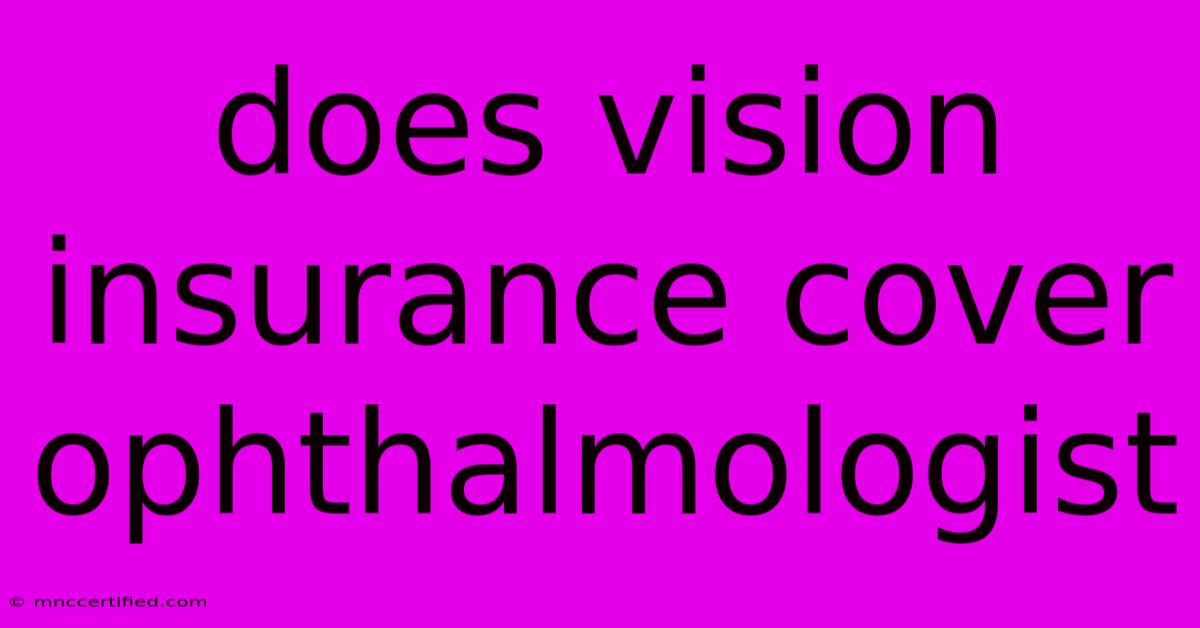Does Vision Insurance Cover Ophthalmologist

Table of Contents
Does Vision Insurance Cover Ophthalmologists? Navigating Your Eye Care Benefits
If you're facing an eye issue, you might be wondering: does my vision insurance cover ophthalmologists? The answer isn't always straightforward. While vision insurance is often associated with routine eye exams and glasses, it can be a bit more complex when it comes to specialized eye care from an ophthalmologist.
Understanding the Difference: Optometrists vs. Ophthalmologists
Before we dive into coverage, let's clarify the difference between optometrists and ophthalmologists:
- Optometrists are primary eye care providers who conduct routine eye exams, diagnose common eye conditions, and prescribe corrective lenses. They typically handle general eye health needs.
- Ophthalmologists are medical doctors who specialize in the diagnosis and treatment of eye diseases and surgical procedures. They handle complex eye issues like cataracts, glaucoma, and retinal detachments.
Vision Insurance Coverage: The Fine Print
Here's where things get tricky:
- Basic vision insurance often covers routine eye exams and the purchase of glasses or contact lenses. It may not cover ophthalmologist visits or procedures.
- Comprehensive vision insurance can offer broader coverage, including some ophthalmologist visits and procedures. However, coverage can vary significantly depending on the plan and the specific service required.
What to Expect with Your Vision Insurance
To determine what your vision insurance covers, it's crucial to:
- Review your policy carefully: The details of your plan will outline the specific services covered, including any limitations or exclusions.
- Contact your insurance provider: If you're unsure about your coverage, reach out to your insurance company directly. They can provide specific information about your plan and answer any questions you may have.
- Inquire about your benefits at the time of scheduling: When booking an appointment with an ophthalmologist, ask the office about their accepted insurance plans and any pre-authorization requirements.
Beyond Vision Insurance: Additional Payment Options
If your vision insurance doesn't cover all the costs associated with your ophthalmologist visit, you might consider these options:
- Health insurance: Some health insurance plans may cover certain ophthalmologist services, particularly those related to medical conditions like diabetes or hypertension.
- Flexible spending accounts (FSAs) or health savings accounts (HSAs): These accounts allow you to set aside pre-tax funds for medical expenses, including eye care.
- Out-of-pocket payment: You can choose to pay out-of-pocket for services not covered by insurance.
Remember, it's essential to be proactive and informed about your vision insurance benefits. Don't hesitate to contact your insurer or provider if you have any questions. Your vision health is crucial, and knowing what your insurance covers can help you make informed decisions about your eye care.

Thank you for visiting our website wich cover about Does Vision Insurance Cover Ophthalmologist. We hope the information provided has been useful to you. Feel free to contact us if you have any questions or need further assistance. See you next time and dont miss to bookmark.
Featured Posts
-
Trumps Musk News Dogecoins Future Outlook
Nov 14, 2024
-
Tilak Varma Leads India To 3rd T20 I Victory
Nov 14, 2024
-
Netflixs Emilia Perez A Divisive Musical
Nov 14, 2024
-
Cava Stock Whats Moving It Today
Nov 14, 2024
-
Elo Mutual Pension Insurance Company
Nov 14, 2024